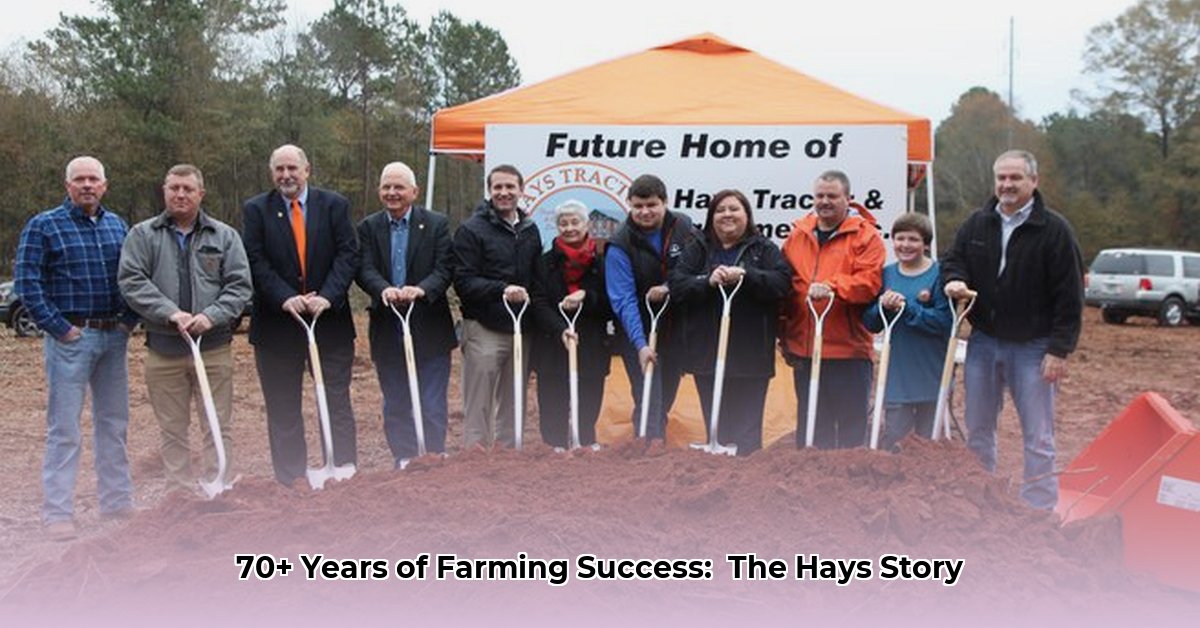
Hays Tractor Mansfield isn't just a farm equipment dealership; it's a case study in multi-generational sustainability within the agricultural sector. For over 70 years, this Mansfield institution has profoundly impacted the local farming community, offering a compelling narrative of adaptation, resilience, and enduring success. This article explores the factors contributing to their longevity, highlighting key strategies that other family-owned businesses in agriculture can emulate. To learn more about Hays Tractor Mansfield, visit their website: Hays Tractor.
From Humble Beginnings to Modern Marvels
Founded in 1951 by Lamar Hays, Hays Tractor initially focused on providing personalized service and expert advice alongside classic Farmall tractors. This emphasis on building relationships laid the groundwork for their enduring success. The business wasn't simply about selling equipment; it was about partnering with farmers to ensure their success. Over time, Hays Tractor adapted, embracing modern technology and brands like Kubota, reflecting a commitment to staying at the forefront of agricultural innovation. This evolution, mirroring the changes in the agricultural industry itself, showcases their remarkable adaptability. Isn't proactive adaptation crucial for long-term survival in any industry, especially one as dynamic as agriculture?
A Family Affair: Navigating Change and Challenges
The transition across generations presents unique challenges for family businesses. Lamar Hays' illness forced an unexpected leadership change, testing the family's resilience and adaptability. This period underscored the importance of succession planning and clear communication within the family structure. The subsequent leadership shift to a female leader signals a commitment to modern approaches and diversity within a traditionally conservative industry. How have other family-run businesses successfully navigated similar leadership transitions?
The Secret Sauce: People, Partnerships, and Community
Hays Tractor's success isn't solely attributable to the equipment it sells; it's deeply rooted in its people, partnerships, and community involvement. The staff are viewed as trusted advisors, offering expert guidance and personalized service, resulting in exceptional customer loyalty. Furthermore, their deep engagement with the Mansfield community—through active participation in local events and support for agricultural initiatives—has fostered strong relationships and reinforced their position as a vital part of the local ecosystem. This dedication to building genuine relationships – both with customers and the broader community – has been critical to their sustained success. What percentage of small businesses attribute their success to strong customer service and community engagement, and how does Hays Tractor's experience inform that statistic?
Riding the Waves: Adapting to the Agricultural Tides
The agricultural industry is characterized by constant change. Economic fluctuations, technological advancements, and skilled labor shortages pose ongoing challenges. Hays Tractor's ability to navigate these complexities stems from a proactive approach to adapting to market shifts, embracing newer technologies to improve efficiency and customer service, and anticipating future industry needs. Their forward-thinking strategy is essential for long-term growth and sustainability in this dynamic sector. How has their commitment to technological innovation favorably impacted their operational efficiency and customer satisfaction?
A Blueprint for Success: Lessons Learned
Hays Tractor’s enduring success offers several valuable lessons applicable to other family-run businesses and agricultural enterprises. Their experience highlights the importance of comprehensive succession planning, strategic partnerships to expand into new markets and access cutting-edge technologies, the cultivation of skilled employees, and the imperative of building and sustaining strong community ties. This holistic approach is fundamental to their sustained growth and competitiveness.
Charting a Course for the Future: Strategies for Continued Success
The following table outlines short-term and long-term strategies for Hays Tractor, the Hays family, Kubota, and the Mansfield community, drawing from their past successes and future opportunities.
| Stakeholder | Short-Term Strategies | Long-Term Strategies |
|---|---|---|
| Hays Tractor Mansfield | Enhance digital marketing; Implement advanced employee training programs. | Expand service offerings to include precision agriculture technology; Explore sustainable farming practices and alternative energy solutions. |
| Hays Family | Formalize family governance structures; Develop clear communication protocols. | Establish a long-term family business succession plan; Implement robust wealth management strategies. |
| Kubota & Suppliers | Expand joint marketing; Strengthen supply chain relationships. | Collaborate on the development of innovative agricultural technologies; Invest in sustainable supply chain practices. |
| Mansfield Community | Increase sponsorship of local events; Support agricultural education. | Partner with local organizations on workforce development programs; Invest in community infrastructure improvements. |
Conclusion
The success story of Hays Tractor Mansfield serves as a compelling example of enduring family business practices in the agricultural sector. Their ability to adapt to changing market conditions, cultivate strong relationships, and embrace innovation while maintaining core values ensures their continuing relevance and success. Their approach offers a powerful blueprint for other family-owned agribusinesses striving for long-term prosperity and stability. What key takeaway from this case study do you feel is most impactful for family-owned businesses looking to transition to the next generation?